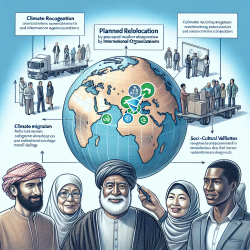Introduction
Trauma-informed care (TIC) has become a cornerstone in various human service contexts over the past few decades. However, its application in refugee resettlement programs remains underexplored. This blog delves into the findings from the research article titled "Working towards Culturally Responsive Trauma-Informed Care in the Refugee Resettlement Process: Qualitative Inquiry with Refugee-Serving Professionals in the United States" to provide practitioners with actionable insights for improving their services.
The Importance of Culturally Responsive TIC
According to the Substance Abuse and Mental Health Services Administration (SAMHSA), TIC is defined as a program, organization, or system that realizes the widespread impact of trauma, recognizes the signs and symptoms, and responds by integrating knowledge about trauma into policies, procedures, and practices. For refugee populations, TIC must also be culturally responsive to address unique trauma and acculturation experiences.
Key Findings from the Study
The study conducted individual interviews with 78 refugee service providers from five resettlement sites. Despite the growing interest in TIC, there is clear inconsistency and inexperience in its adaptation within resettlement programs. Here are some key findings:
- Prevention of Retraumatization: Service providers emphasized the importance of embedding mental health components, such as screening and prompt referral systems, into resettlement programs to prevent retraumatization.
- Groundwork for Trauma Recovery: Mental health professionals highlighted TIC as essential for therapeutic relationships, trauma recovery, and de-stigmatization of mental health issues.
- Current Practice: There is a divide between mental health services, which often integrate TIC as tacit knowledge, and resettlement programs, which lack awareness and capacity for TIC.
- Challenges: The main challenges include a lack of awareness, knowledge, and skills for TIC, as well as a lack of understanding of the refugee resettlement process and culturally responsive practices.
- Opportunities: Growing interest in TIC across various service sectors presents opportunities for training and collaboration to build a more comprehensive TIC framework.
Actionable Steps for Practitioners
To implement culturally responsive TIC in refugee resettlement programs, practitioners can take the following steps:
- Training: Enhance awareness of trauma impacts and cultural sensitivity through targeted training programs for both service providers and refugee clients.
- Resource Allocation: Allocate resources for refugee-specific, culturally informed TIC protocols and training curricula.
- Partnership Building: Foster partnerships among providers, refugee communities, and informal helping sources to ensure coordinated care.
- Community Engagement: Engage the refugee community in the development and implementation of TIC to build trust and ensure cultural relevancy.
Conclusion
Implementing culturally responsive TIC in refugee resettlement programs is crucial for addressing the unique needs of refugee populations. By enhancing awareness, allocating resources, building partnerships, and engaging the community, practitioners can improve service delivery and outcomes for refugees.
To read the original research paper, please follow this link: Working towards Culturally Responsive Trauma-Informed Care in the Refugee Resettlement Process: Qualitative Inquiry with Refugee-Serving Professionals in the United States.










